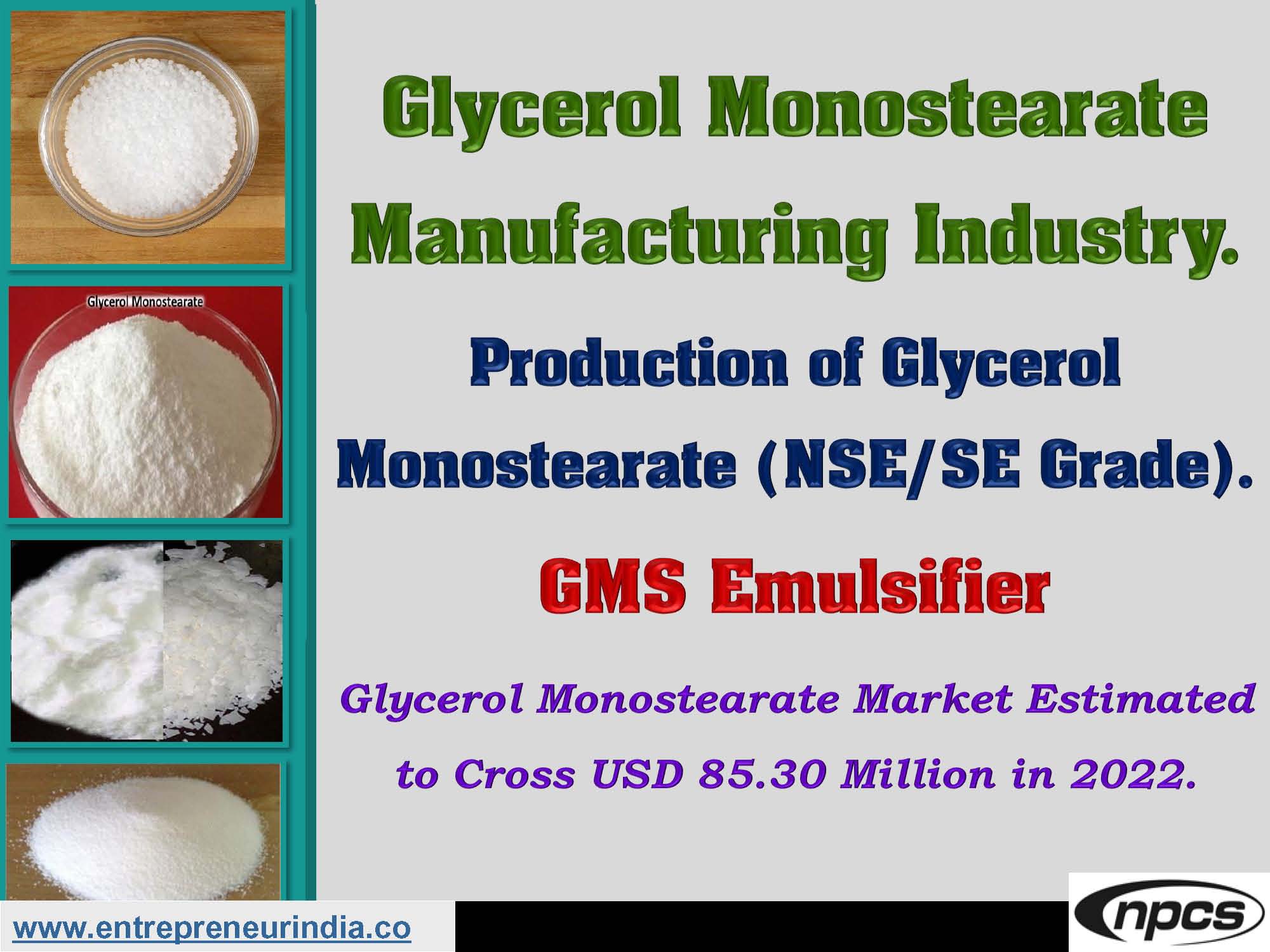
The Glycerol Monostearate Manufacturing Industry is rapidly expanding due to the compound’s extensive applications in food processing, pharmaceuticals, personal care, and plastics. Glycerol monostearate (GMS) is a multifunctional ingredient, prized for its emulsifying, thickening, anti-caking, and stabilizing properties. With the increasing global emphasis on food texture improvement, clean-label ingredients, and functional cosmetics, the demand for GMS has surged, creating a highly profitable and sustainable business opportunity for manufacturers.
What is Glycerol Monostearate and Why It’s in Demand
Glycerol monostearate (GMS) is a monoglyceride commonly used as a food additive and emulsifier. It is formed by the esterification of glycerol and stearic acid, typically derived from plant or animal fats. GMS appears as a white, odorless, and tasteless flaky powder or waxy solid, and is approved for safe use in numerous countries including those under FDA and EFSA regulations.
Major attributes of GMS:
-
Excellent emulsifying and stabilizing agent
-
Acts as a thickener and anti-caking agent
-
Prevents starch retrogradation in baked goods
-
Improves shelf life and moisture retention
-
Safe for consumption and skin contact
These characteristics make Glycerol Monostearate Manufacturing vital to the modern industrial value chain.
Applications of Glycerol Monostearate Across Industries
Food Industry:
-
Used in ice creams, whipped cream, margarine, and baked products.
-
Enhances smoothness, prevents separation, and improves mouthfeel.
-
Helps maintain moisture in bread, cakes, and cookies.
Pharmaceuticals:
-
Acts as a drug delivery excipient in tablets and capsules.
-
Used in creams, ointments, and topical gels for enhanced absorption.
Cosmetics & Personal Care:
-
Used in lotions, creams, sunscreens, and hair products.
-
Provides emolliency and stabilizes oil-water emulsions.
Plastics and PVC Industry:
-
Functions as a lubricant and anti-static agent in polymer processing.
-
Enhances flowability and prevents static charge build-up.
Agriculture:
-
Used in pesticide formulations as an emulsifier and stabilizer.
This cross-industry application makes the Glycerol Monostearate Manufacturing Industry highly versatile and resistant to demand shocks.
Manufacturing Process of Glycerol Monostearate
The manufacturing process primarily involves esterification or glycerolysis. The two common industrial methods include:
1. Direct Esterification Method:
-
Raw Materials: Glycerol and stearic acid (from palm oil, tallow, etc.)
-
Reaction is carried out at 180–250°C in the presence of an acid catalyst.
-
Water formed during the reaction is removed under vacuum.
-
The mixture is then cooled, neutralized, filtered, and dried.
2. Glycerolysis Method:
-
Triglycerides (oils/fats) are reacted with glycerol in the presence of a base or enzyme catalyst.
-
Yields a mixture of monoglycerides, diglycerides, and triglycerides.
-
Monoglycerides are separated using distillation or molecular filtration.
Post-processing includes flaking, granulation, or spraying to meet specific industrial formats.
Setting Up a GMS Manufacturing Plant
Starting a Glycerol Monostearate Manufacturing facility requires medium capital investment and standard chemical processing equipment. A typical plant includes:
-
Reactor Vessels (stainless steel, high-temp)
-
Heating & Vacuum Systems
-
Neutralizers and Filters
-
Cooling Units and Solidifiers
-
Dryers and Pulverizers
-
Packaging & Storage Units
Raw Material Sources:
-
Glycerol: Byproduct of biodiesel or soap manufacturing.
-
Stearic Acid: Derived from palm oil, tallow, or hydrogenated fats.
A mid-sized unit producing 1–5 tons per day can serve regional and export markets efficiently. Investment costs may range from $500,000 to $2 million depending on automation level.
Market Demand and Profit Potential
The global market for Glycerol Monostearate is valued at over $1.5 billion and expected to grow steadily at 6% CAGR, fueled by:
-
Clean-label demand in food
-
Growth in skincare and cosmetics
-
Expansion in PVC and packaging industries
Profitability Indicators:
-
Gross Margin: 35%–50%
-
Net Margin: 15%–25%
-
Payback Period: 2–3 years
Manufacturers who offer multiple grades of GMS (food, pharma, industrial) can tap into diverse markets and reduce risk. Exporting to GCC, Southeast Asia, and Africa presents strong revenue potential.
Regulatory Standards and Quality Control
To succeed in the Glycerol Monostearate Manufacturing Industry, compliance with national and international standards is crucial. Certifications include:
-
FSSAI (India) / FDA (USA) for food-grade GMS
-
ISO 22000 / HACCP for food safety management
-
USP / EP / IP standards for pharma-grade quality
-
REACH compliance for European markets
-
Halal and Kosher certifications for broader market access
Regular testing for acid value, saponification value, purity, heavy metals, and microbial limits ensures consistent quality.
Challenges in GMS Production and How to Overcome Them
Some hurdles in the Glycerol Monostearate Manufacturing space include:
-
Fluctuating raw material prices (especially glycerol and stearic acid)
-
Separation of high-purity monoglycerides
-
Environmental waste from esterification
-
Maintaining consistent product quality across batches
Solutions include:
-
Backward integration with glycerol sources
-
Enzyme-based processes for higher selectivity and lower temperatures
-
Effluent treatment systems and waste recycling
-
Investment in R&D for formulation innovation and customization
Future of the GMS Industry: Sustainability and Innovation
The future of the Glycerol Monostearate Manufacturing Industry is deeply connected to sustainability and functionality:
-
Bio-based and organic GMS gaining traction
-
Nano-emulsion technologies using monoglycerides for advanced skincare
-
Increased use in vegan and cruelty-free formulations
-
Digitally tracked traceability of raw material sourcing
Advanced research in enzymatic esterification and green chemistry will further enhance yield, reduce energy consumption, and open doors to high-purity specialty grades.
Conclusion
The Glycerol Monostearate Manufacturing Industry offers a robust, multi-sector opportunity for entrepreneurs and chemical manufacturers. With consistent demand across food, pharma, personal care, plastics, and more, GMS stands out as a versatile and high-margin product. Businesses that invest in quality, compliance, and innovation can not only capture regional markets but also establish themselves as reliable global exporters.
Niir Project Consultancy Services
An ISO 9001:2015 Company
106-E, Kamla Nagar, Opp. Spark Mall,
New Delhi-110007, India.
Email: npcs.ei@gmail.com , info@entrepreneurindia.co
Tel: +91-11-23843955, 23845654, 23845886, 8800733955
Mobile: +91-9811043595
Website: www.entrepreneurindia.co , www.niir.org



